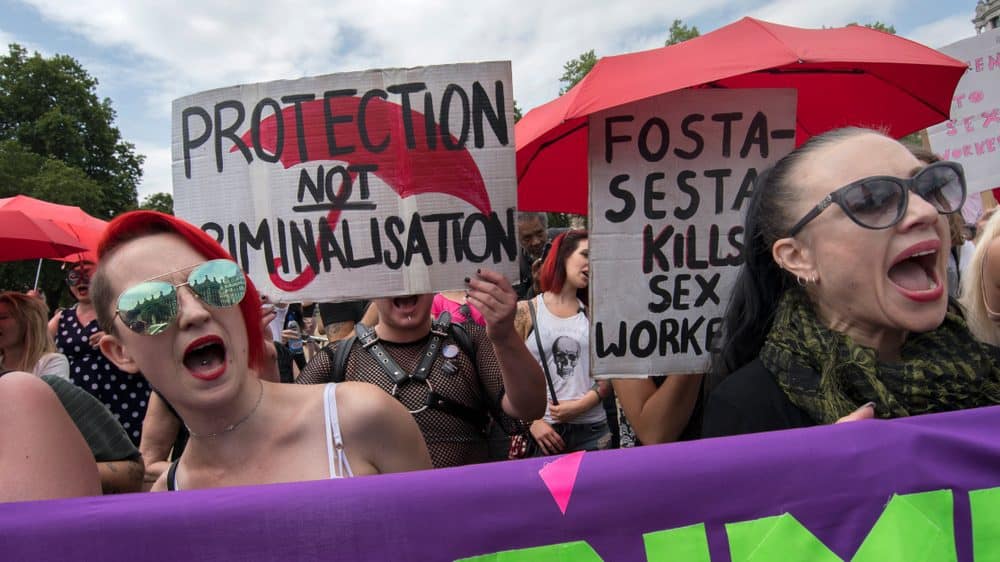Sex Work is a Disability Issue. So Why Doesn’t the Disability Community Recognize That?
Sex workers face enormous risks of violence both from the police and from clients, and they are about to face more. The Fight Online Sex Trafficking Act/Stop Enabling Sex Traffickers Act (FOSTA/SESTA) just went into effect, a law that makes it possible for websites to be held civilly and criminally liable if their platforms are used to advertise prostitution. This includes consensual sex work. In preparation, many platforms are banning sexual content which can directly lead to more violence against sex workers, especially disabled sex workers. Here’s how: Lots of sex workers use online platforms to advertise and promote their services. Online tools also provide a way for sex workers to alert each other about dangerous clients and can help give sex workers a way to screen them out. As online sex work resources dwindle, sex workers will have less available resources for screening. Combined with the loss in income from less advertising, this may cause sex workers to be more likely to accept potential dangers that they did not have to face previously, which can in turn lead to more violence, rape, and murders of sex workers.
While the sex work community has been vocal and fighting against these new changes, other communities that should be supporting them are suspiciously silent. Specifically, the disability community. A huge piece that tends to be missing from conversations around FOSTA/SESTA is that a large number of sex workers are also disabled. Disabled (and other multiply marginalized) sex workers are likely to feel the effects of increased violence more acutely. As such, I believe that in order to work towards true disability justice, the disability community needs to understand that sex work is a disability issue and we need to put our full resources towards fighting all laws that harm sex workers.
Accessibility, Ableism, and Earning a Living
Non-criminalized jobs are often inaccessible to disabled people. Many disabilities, including chronic illnesses and mental health disabilities, involve periods of flares and remissions, making it difficult for disabled people to hold down a traditional job. One sex worker I spoke with, Livia, explained that disability is the main reason that she does sex work. Her mental and emotional disabilities make her unable to work a full eight-hour day and sex work allows her to work only a few hours at a time. She also noted that since sex work “has a relatively high hourly rate [it] also allows me to support myself as a disabled person who can’t work full time and doesn’t receive familial or state forms of support.”
However, Livia, who is able to do street-based sex work, makes an important point: “The access I have to street-based work is predicated on the fact I am physically able-bodied, able to stand for long periods and leave my home to work, and am able to work in a general rather than niche market unlike some of my physically disabled sex worker friends.” As such, FOSTA/SESTA will especially hurt sex workers who have physical disabilities that make working on the street to earn money difficult or impossible.
In a Rewire.News piece from earlier this year, Cyrée Jarelle Johnson noted that disabled sex workers “experience poverty and job discrimination at uniquely high rates.” For many disabled folks, sex work and other underground economies are the only way they can survive. Even disabled people that are able to access some government benefits may be forced to supplement the measly benefits they are provided.
If you are disabled in a way that the government recognizes, and are able to jump through specific hoops, some disabled people can collect SSI (Supplemental Security Income) or SSDI (Social Security Disability Insurance). As the system currently exists, even those that qualify are not given enough to live on. The maximum SSI payment in 2019 is $771 per month. That’s less than $10,000 per year.
While it claims otherwise, the social security system actually disincentives work for disabled people and even small amounts of income can affect benefit payments. Individuals on SSI are only allowed to earn $65 per month before the government begins to reduce their benefits. This means that many disabled people are forced to turn to criminalized work in order to make ends meet because disability payments are not enough and any “on the books” employment.
Trauma and Sex Work
Sex work is dangerous and frequently traumatic. A lot of anti-sex work folks use this to argue against sex worker protections and decriminalization, but they have it backwards. There is nothing inherently traumatic about sex work for those who choose it. What makes sex work dangerous is the lack of protections for sex workers from both dangerous clients and police and the carceral system.
We don’t talk about this enough, but trauma is disabling. As criminalization makes sex work disproportionately traumatic compared to other professions (and yes, sex work is a profession), even if people are not disabled when they start sex work, they may become disabled from the trauma imposed upon them. (As is common in many jobs that are predominantly performed by poor people, especially people of color: e.g. coal mining, the military, meat packing plants.)
Thus, the mainstream disability rights community needs to fight for sex worker rights, including the repeal of FOSTA/SESTA.
Disabled sex workers and those with other overlapping marginalized identities, such as BIPOC and trans and gender non-conforming sex workers, will always be disproportionately affected by these changes. While sex workers who are not of these particular marginalized identities may have more options for other employment or are still able to get by financially without taking risks, disabled and other multiply marginalized sex workers may have no other options. Sex workers are victimized by both law enforcement and dangerous clients. With less online tools, sex workers will be increasingly forced into situations where they are more likely to be targeted, harassed, arrested and abused by law enforcement.
While sex worker rights organizations have been fighting these regulations tooth and manicured nail, they need support. As disabled people and disability justice advocates, we need to understand how disability justice is intertwined with other fights. Disability justice requires advocating for the rights of sex workers to be able to do their job safely.
About Rooted In Rights
Rooted in Rights exists to amplify the perspectives of the disability community. Blog posts and storyteller videos that we publish and content we re-share on social media do not necessarily reflect the opinions or values of Rooted in Rights nor indicate an endorsement of a program or service by Rooted in Rights. We respect and aim to reflect the diversity of opinions and experiences of the disability community. Rooted in Rights seeks to highlight discussions, not direct them. Learn more about Rooted In Rights



